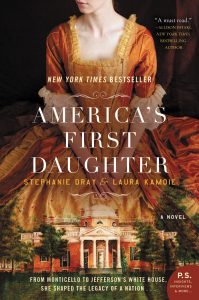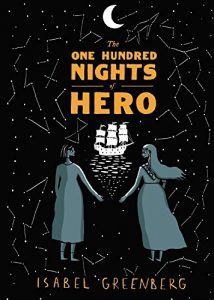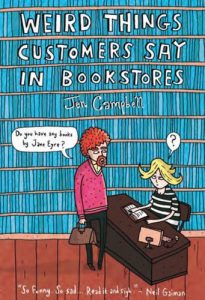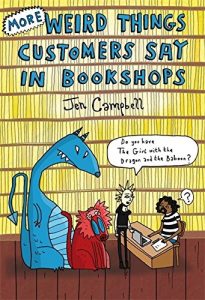Monticello by Sally Cabot Gunning
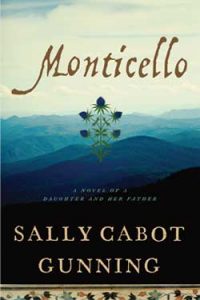 I hope you will forgive me, but I will quote a professional review which captures perfectly, the book I just finished — Monticello by Sally Cabot Gunning.
I hope you will forgive me, but I will quote a professional review which captures perfectly, the book I just finished — Monticello by Sally Cabot Gunning.
“A brilliant exploration of what it meant to be a slave owner in antebellum Virginia where farming depended on slaves, and their presence in the household gave them an intimacy with family members that could be both comforting and threatening. This story of Thomas Jefferson’s devoted daughter, the indomitable Martha Jefferson Randolph, helps us understand all the complexities and contradictions endured by Martha and her family as they struggle with their consciences and responsibilities toward their families, their plantations, and the people who work for them. Highly recommended as an engrossing tale of a strong woman in tumultuous times, with deftly interwoven historical details that make her trials all the more authentic.”
— Library Journal
Historical fiction fascinates me, but only when the author doesn’t stray too far from actual events. Ms. Gunning based this historical novel on actual correspondence between Thomas Jefferson and his eldest daughter Martha. The author says:
As soon as I came across a letter the fourteen year-old Martha Jefferson wrote: “I wish with all my soul that the poor Negroes were all freed . . .” I was hooked. I read all of Martha’s letters to her father and his to her.
The book follows Martha Jefferson Reynolds, her revered father Thomas Jefferson, and their families as they live their lives and make history at Monticello during the late 1700’s to early 1800’s.
Martha adores her father and wishes nothing more than to work with him to build and manage the Monticello plantation. But her relationship with her father is complicated not only by the entire issue of slaves, but the intimacy between her father the coddled slave, Sally Hemings.
While this strained relationship with her father is crucial to her life, the majority of the book is devoted to her difficult marriage. Martha marries Tom Randolph and over the years, gives birth to 12 (yes 12!) children. Martha and Tom struggle. Tom is often depressed and their financial failures and dependence on Thomas Jefferson further threatens their marriage.
(One reviewer pointed out that Thomas Mann Randolph is portrayed unfairly as a weak, paranoid alcoholic who lived as a parasite on the goodwill of Thomas Jefferson. Despite the fact he served in both houses of the Virginia Assembly, became a Congressman and then Governor of Virginia.)
Monticello plays a wonderful backdrop in this novel. Nestled in the beautiful Blue Ridge Mountains, we see how the gardens were treasured. How Jefferson experimented with crops and imported plant seeds. Descriptions of the clothing, home furnishings, and architectural details of Monticello allows the reader to see it as a true home where Jefferson escaped his political worries and thrived.
But we can’t escape the fact that Monticello was a working plantation with slaves. And, even though Thomas Jefferson spoke out against the institution of slavery, at the same time he owned slaves of his own – and fathered numerous children with one of the them (Sally Hemings).
Monticello (the book) gives insight into this Jeffersonian paradox, and what is today, totally incomprehensible. We see plantation life in all its light and darkness, not to mention the usually caring, but sometimes cruel human interaction of slave and master.
Through Martha’s eyes we see Thomas Jefferson as a beloved father, an architect of our constitution, a renaissance man, and an intellectual. But most importantly, we also see him as just a man, like any other man in any other time period — struggling with the political tsunamis and conflicting morals of his time.
I was thoroughly lost in the pages of Monticello and had trouble putting it down. When I did have to stop reading, (you know meals, sleep, showering, those pesky interruptions) it took me a bit to clear my mind and return to current day life.
Monticello is one of my favorite historic sights and you must visit, but in the meantime you can see Jefferson’s library HERE. (It’s swoon-worthy)
N.B. The day after I finished this book, I purchased this other novel about Martha Jefferson. It was my birthday, I’d hurt my back and I didn’t need any more excuses — and so it goes. Another Jefferson read awaits me.
The Farm by Tom Rob Smith
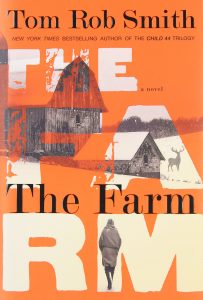 For some reason, I’ve been on a dark(ish) thriller reading binge and remembered I had this best seller waiting for me on my Kindle.
For some reason, I’ve been on a dark(ish) thriller reading binge and remembered I had this best seller waiting for me on my Kindle.
A couple of years ago, Mr. Smith was interviewed on NPR where he described his family’s real life crisis which was the genesis for The Farm.
From the interview introduction: In the spring of 2009, British author Tom Rob Smith received a disturbing phone call from his father. “And he was crying,” Smith tells NPR’s David Greene. “He never cries. And he said to me, ‘You’ve got to come to Sweden. Your mom has suffered a psychotic episode, and she’s in an asylum.’ ” Then, Smith’s mother called. She had just been released from the psychiatric hospital in Sweden, and she said everything his father had told him was a lie.
The Farm is about a couple who, like Mr. Smith’s actual parents, retire to the idyllic Swedish countryside. As the novel unfolds, Tilde the mother, has just recently been released from a mental ward and she is carefully and methodically telling her story to her son Daniel. She reveals puzzling circumstances — how she, and his father Chris, moved to the farm, not to fulfill their dreams, but because they had gone bankrupt, losing all their investments in a real estate scheme. Tilde’s story gets darker and more irrational, the crimes she’s witnessed, the conspiracies around her, and how she has been deemed a madwoman.
Tilde’s story is filled with fear and paranoia– sprinkled with some Scandinavian evil (including some shiver-worthy Nordic troll fairy stories). Tilde is a true unreliable narrator –or is she? How much is true and how much is imagined? Why was she admitted for psychiatric observation, and was it justified?
“Paranoia might be a mental illness–or a means of survival.”
All these questions and more will whisper in the back of your head as you read The Farm. At first, I didn’t know what to make of the odd structure of this book, but it gradually caught me up in its web.
The plot does not unfold in real time and there are stories within stories, but Mr. Smith does not let this get confusing. It’s fast paced, suspenseful, and often smart.
“The people you think you have known all your life can be completely different, for different reasons that you have never known anything about.”
But I had some problems with The Farm. The first was Tilde’s voice. She is supposedly “telling” the story throughout the book, but Mr. Smith gives her sometimes unrealistic dialogue. No one speaks like this: “He was trying to soothe me as if I were a startled horse.” or “As he emerged from the gloom of his underground lair.” In the same vein, I just grew tired of the singularity of Tilde’s voice — it goes on for over 200 pages. Mr. Smith breaks it up with Daniel’s point of view, but not nearly enough to prevent the story line from occasionally becoming snooze-worthy.
I hoped that finding the truth to this story was going to be tricky and astonishing, but sadly, I found the ending abrupt and obtuse. As if the author couldn’t figure out how to work out the truth and so just closed the novel with a final incomprehensible chapter. But then again, maybe life isn’t meant to be so neatly packaged.
The Farm is a suspenseful thriller, but with an unsettling ending – perhaps this is the author’s intent.
I think I’ll take a break from these dark thrillers for a bit.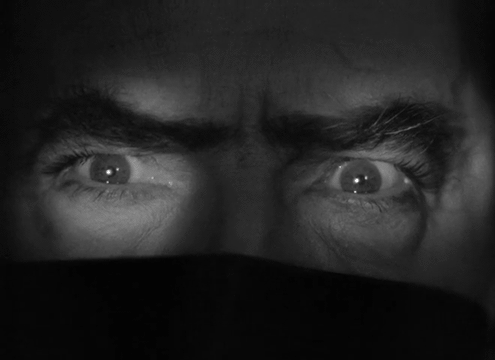
A digital advanced readers copy was provided by Grand Central Publishing via Netgalley.
Elegance by Kathleen Tessaro
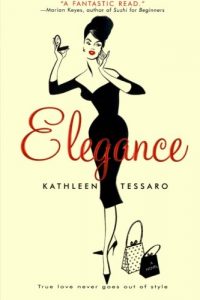 I have always admired Audrey-Hepburn-like-elegance, but alas, my body and temperament opt for comfort. Once, on a daily basis, I achieved tailored and professional — but never elegant.
I have always admired Audrey-Hepburn-like-elegance, but alas, my body and temperament opt for comfort. Once, on a daily basis, I achieved tailored and professional — but never elegant.
This appreciation for long necks and sleek evening dresses must have caused me to acquire this book. I found it during my January book clean out and stacked it on my bedside table, unsure, but vowing to give it my 50 page audition.
The other night I picked up Elegance, and was surprised to find myself chuckling at this cute concoction. I’m not a fan of chic lit, but the premise is clever.
The author actually found a book in a second-hand store called “Elegance: A Complete Guide for Every Woman Who wants to Be Well and Properly Dressed on All Occasions” written by Genevieve Antoine Dariaux in 1964. Ms. Tassaro, with permission from Dariaux, wrote this novel based on her find. See? Clever right?
The novel uses the advice from Dariaux at the start of each chapter, such as this from the opening:
What is elegance? It is a sort of harmony that rather resembles beauty with the difference that the latter is more often a gift of nature and the former a result of art. If I may be permitted to use a high sounding word for such a minor art. I would say that to transform a plain woman in to an elegant one is my mission in life.
Our protagonist, Louise, either heeds or disregards this out-dated (and often derivative) advice as she contemplates her own disastrous life.
Louise is an imperfectly real character. Her past is filled with eating issues, difficult parents, failed relationships, and a lackluster career.
Her marriage is over:
It’s been months now – months of conversations, arguments, silences, tears. We have ‘given it one more week’ again and again and again. It’s like trying to amputate a limb with spoon.
Louise is not getting anything from her therapy sessions:
[Therapists] always want to know why; there’s not a lot of difference between a therapist and a four-year old.
She doesn’t have any close girlfriends to talk to, she’s lost, and can’t pinpoint what she really wants.
Then one day Louise finds Dariaux‘s slim volume in a London used bookshop. I just have to share this lovely passage ~~ hail comrade!:
My husband claims I have an unhealthy obsession with secondhand bookshops. That I spend too much time daydreaming altogether. But either you intrinsically understand the attraction of searching for hidden treasure amongst rows of dusty shelves or you don’t; it’s a passion, bordering on a spiritual illness, which cannot be explained to the unaffected.
With Dariaux’s self help book, Louise begins to change herself and her life — much goes well, some does not. She applies a self-tanning cream which turns her orange just before a job interview. Louise unwittingly invests a small fortune at a department store makeup counter and discovers fine lingerie.
Louise not only adapts to high heels, she starts opening up to those around her, breaking out of her shell. She dumps her soul-sucking therapist. She leaves her husband. Friendships are formed and she even lands a new job. In one of my favorite chapters, Louse is invited to a typical English country house weekend, which is described in delicious detail – from the village names to the parlor room games in the evening.
Louise comes into herself and her life — but it is not a fairy tale ending. It’s as imperfect and real as she is. Turns out yes, elegance has it’s rewards but also a price.
Elegance makes for a fun evening, like sharing ice cream straight from the carton with a good friend. A light and fluffy break from those dark thrillers (I’ve had enough of those for a bit) or the nightly news.
Genevieve Antoine Dariaux’s 1964 original advice volume is still in print and available – see more HERE
Elegance is Ms. Tassaro‘s first novel, published in 2003 and she has since had several best sellers in the same realm. See her books HERE.
Shelter by Jung Yun
This debut novel opens with a suburban family struggling with debt. Kyung and his wife, with their young son, are financially underwater – they owe more on their house than it is worth, their credit cards are maxed out, and the bills have been pilling up for months.
Their sense of want was always more powerful than their sense of reason.
Kyung and his parents came to the United States from Korea when he was small. But as an adult, Kyung has been estranged from his family for years, and is unwilling to ask them for help, despite the fact they are wealthy and live in an ultra-exclusive neighborhood just up the hill.
As the book opens, Kyung and his Irish-American wife, Gillian are showing their home to a realtor, who is less than enthusiastic about the probability of a good sale.
It is here, right in the first chapter, that Ms. Yun rips this typical-seen-it-before plot open and twists it into a completely unexpected direction.
As the realtor is explaining the less than ideal prospects for their home sale, they suddenly see Kyung’s mother wandering, naked and beaten, in their back yard — crying and babbling in her native Korean.
Whoa — didn’t see that coming.
I don’t want to give too much away about this compelling, but unsettling story line. There are many layers and deep issues within Shelter that must be read in context and first-hand. So, very carefully I will tell you a bit more, just to entice you to read this well crafted, but brooding novel.
The estranged family is thrust together in the wake of a violent attack on Kyung’s parents. They must live together – in Kyung’s tiny, over-mortgaged home.
Tensions quickly surface, there are old resentments, generational mistrust, and the guilt of wanting, but not being able to –forgive. Ms. Yun stirs this together with cultural dynamics, family secrets and the pressure of immigrants wanting to be American at any cost.
Ms. Yun has delivered not only a driving, suspenseful plot but also an exploration of the complexities of family, the immigrant experience, domestic violence, and the grace of forgiveness.
I warn you, Shelter is not a lighthearted read, but at the same time, I found it utterly compelling and finished it in two days.
Shelter is well worth your time. Upon finishing, you’ll be sad, but this complex and beautifully rendered novel will stick with you, as there is much to contemplate and consider.
And isn’t that why we read? For these occasional gems that stay with us long after we’ve closed the last page.
A digital advanced readers copy was provided by Picador Publishing via Netgalley in 2016.
Library Haul
The San Francisco Library allows users to request books, and when they become available, they are delivered to your closest branch library. My local branch is a short walk away so it’s wildly convenient. This time, when three hold items all came in at once, I was momentarily overwhelmed but pleased.
So here’s my haul:
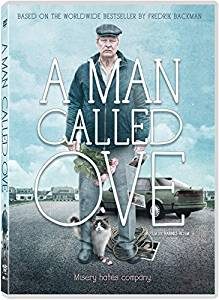 A Man Called Ove (DVD)
A Man Called Ove (DVD)
Based on the book which I read and highly enjoyed, this film is in Swedish with English subtitles.
The film stayed very true to the book and the casting is wonderful. Rolf Lassgard’s portrayal of Ove is perfection. Even the housing development was exactly how I pictured it.
This is a heartwarming movie. Funny, sad, and loving. I recommend you read the book first, then watch this delightful film. Even Husband enjoyed it, despite the absence of guns and things blowing up.
The One Hundred Nights of Hero by Isabel Greenberg
This graphic novel was named a best book of 2016 by both NPR and Publishers Weekly, and I’d read about it on several blogs. I placed my library request for One Hundred Nights so long ago, I’d forgotten I’d done so. I opened this book, not remembering anything about it, and was soon down a rabbit hole — lost in a fairy tale. Because that is what this is – a revisionist fairy tale– a feminist retelling of The Arabian Nights.
Like Scheherazade saving her own life by telling tales, in a magical, yet misogynist medieval world, Hero must tell stories every night for 100 nights if she and her true love Cherry are to survive the sexual advances of Cherry’s evil husband and his equally wicked friend.
But it’s a far more intricate puzzle — a story of a story within a story about brave, complicated women and sisters protecting each other, usually from men. It goes deep into the legacy of female bonds and the power of storytelling.
We shall tell all the stories that are never told. Stories about bad husbands and murderous wives and mad gods and mothers and heroes and darkness and friends and sisters and lovers… Yes! And above all… Stories about brave women who don’t take s#*t from anyone.
I can’t say I loved this book — I found it charming, yet peculiar. The feminist, lesbian agenda sometimes overwhelmed the often beautiful writing and the fairy tale-like ambiance. And I found the graphics stark and not very fairy-tale-like (if that makes sense…).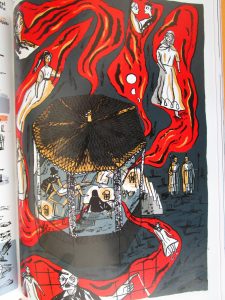
But I will say, the physical experience of reading an oversize graphic novel, in a non-linear way through the story illustrations…brought me right back to being a little girl, lost in the world of a large picture book open on my lap — very, very relaxing.
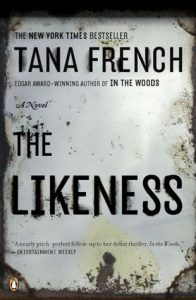 The Likeness by Tana French
The Likeness by Tana French
Tana French’s thrillers are anything but relaxing, they are gripping, hold-you-by-the throat-and-not-let-you-go reading.
Set after In the Woods, the first book in the Dublin Murder Squad series, this book focuses on detective Cassie Maddox, the best friend of Rob Ryan, the narrator of the first book. In this installment, Cassie narrates, as she is pulled into an old undercover role
A woman is found murdered and she’d been using Cassie’s fake (and discarded) undercover identity of Lexie Madison. To complicate matters, Cassie is a dead-ringer for this this murder victim. Her commander from undercover comes up with a plan — leak to the media that Lexie wasn’t actually dead, but in a coma, and for Cassie to go back into undercover once again as the murdered Lexie to lure the killer to finish the job.
I know – say what? Utterly implausible! But when Ms. French is telling a story, you deferentially suspend disbelief as she takes you on a thoroughly gripping ride.
Cassie/Lexie assumes the persona and has to return to the house she shared with Daniel (who inherited the house), Rafe, Abby and Justin — an insular group of university students who enjoy a close and intense friendship.
As the murder squad investigates the (now revisionist) attempted murder, they confiscate the other housemates phones giving Cassie videos that she relentlessly studies in order to act, talk and “become” the murdered Lexie. Eventually Lexie returns to Whitethorn House having come out of her coma but suffering (convenient) memory loss
It took my breath away, that evening. If you’ve ever dreamed that you walked into your best-loved book or film or TV program, then maybe you’ve got some idea how it felt: things coming alive around you, strange and new and utterly familiar at the same time; the catch in your heartbeat as you move through the rooms that had such a vivid untouchable life in your mind, as your feet actually touch the carpet, as you breathe the air; the odd, secret glow of warmth as these people you’ve been watching for so long, from so far away, open their circle and sweep you into it.
The Likeness excels at its psychological insights especially for Cassie, who in her real life is lonely and shattered from her previous case. She finds friendship — nay, family, among her new Lexie friends. These blurred identities are made believable with the beautifully written scenes and well developed characters who live, love and murder within the walls of Whitethorn House. The setting and moods are almost palpable and glitter with life. But Cassie gets lost inside her assumed identity and finds herself in a maze of murder quickly spinning out of her control. This is breath-holding stuff,
As others have said, there are many similarities to Donna Tart’s A Secret History – both have dreamy academic types living together in a beautiful, run-down house.
But The Likeness makes you feel for Cassie — what she lost and can never regain. The heartbreak of assuming a new identity, being part of a loving family, and finding a home in the world ~~ but in the end, it’s only a likeness.
For the Love of Bookshops
Just as I am drawn to books about books, I also can’t pass up a book about bookshops.
Like most bibliophiles, I am physically unable to walk past a bookstore of any sort. Even when traveling, where the books are in another language, where there’s nothing I can comprehend, I still have to wander into the bookshops. Just to look around and breathe the smell of books. (Husband is the same way with hardware stores – and yes, I tolerantly tag along. But, between you and me, how many drill bits can one guy use? Whoops, better not go there, looking around at the results of my own book addiction habit)
A friend brought The Bookshop Book back from a trip to the U.K. and passed it on to me as a Christmas gift. This sexy British publication has been sitting next to my reading chair even since, enticing me –whispering in my ear. So the other night I finally succumbed.
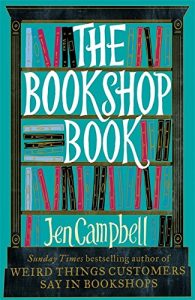 Jen Campbell is a British poet, author and book reviewer, who has a wonderful video blog on YouTube where she talks about her favorite books.
Jen Campbell is a British poet, author and book reviewer, who has a wonderful video blog on YouTube where she talks about her favorite books.
I’ve become rather addicted to seeing my favorite book bloggers on their video blogs (Vlogs). Simon has done the same here. Don’t hold your breath, Book Barmy will stay as is. The world is not ready for videos with my mug yacking on about books. Nor am I, I’d have to fix my crazy hair, do something involving makeup and don a video worthy shirt.
But I digress – back to The Bookshop Book, how could I resist its siren call after reading this from the book’s front flap?:
Every bookshop has a story.
We’re not talking about rooms that are just full of books. We’re talking about bookshops in barns, disused factories, converted churches and underground car parks. Bookshops on boats, on buses, and in old run-down train stations. Fold-out bookshops, undercover bookshops, this-is-the-best-place-I’ve-ever-been-to-bookshops.
Meet Sarah and her Book Barge sailing across the sea to France. Meet Sebastien, in Mongolia, who sells books to herders of the Altai mountains. Meet the bookshop in Canada that’s invented the world’s first antiquarian book vending machine.
And that’s just the beginning.
From the oldest bookshop in the world, to the smallest you could imagine, The Bookshop Book examines the history of books, talks to authors about their favourite places, and looks at over three hundred weirdly wonderful bookshops across six continents (sadly, we’ve yet to build a bookshop down in the South Pole).
The Bookshop Book is a love letter to bookshops profiling the famous, such as Shakespeare and Company in Paris and Powell’s in Portland, Oregon, but also some smaller, lesser know shops around the world.
Ms. Campbell also profiles many of the bookshop owners, whom prove to be a wonderfully diverse and quirky lot — many of whom I would love to share a cup of tea and a chat. Authors talk about their favorite bookstores and there’s little snippets of interesting bookish facts.
It was most encouraging to learn that, in this digital age, bookshops around the world continue to survive and in many cases, thrive.
This book had me at hello.
Ms. Campbell is also the author of these two fun books:
These books have a special place in my heart as I work/volunteer at the wonderful Readers Bookstore. Working in the store proves to be one of my favorite things, largely because of the customers who come in searching for their next book. Often they have a book in mind, but can’t remember the title or even the author, but try and describe it based on what they do know about the book. “It’s about a man who lived with elephants for a year”…or, “you know it’s on the bestseller list, about a crocodile?” 
It’s always a challenge and a delightful victory to finally figure out what book they mean.
Ms. Campbell also worked at in a bookshop for many years and turned these often bazaar conversations into two very funny, quickly readable, books.
Both Weird Things Customers Say in Bookstores books celebrate not only bookstores, but the underpaid yet dedicated booksellers who lovingly help the myriad of colorful characters who walk through their doors everyday.
I will now quote from the books, but this is only a small taste of the very fun you’ll have reading these cheerful books:
~~~~~~~~~~~
CUSTOMER: Did Charles Dickens ever write anything fun?
~~~~~~~~~~~~
CUSTOMER: Doesn’t it bother you, being surrounded by books all day? I think I’d be paranoid they were all going to jump off the shelves and kill me.
~~~~~~~~~~~~
CUSTOMER: Do you have a copy of Jane Eyre?
BOOKSELLER: Actually, I just sold that this morning, sorry!
CUSTOMER: Oh. Have you read it?
BOOKSELLER: Yes, it’s one of my favourite books.
CUSTOMER: Oh, great (sits down beside bookseller). Could you tell me all about it? I have to write an essay on it by tomorrow.
~~~~~~~~~~~~
CUSTOMER: Hi, I just wanted to ask: did Anne Frank ever write a sequel?
~~~~~~~~~~~~
CUSTOMER: (an elderly woman) I can’t believe everybody’s reading this Fifty Shades book
BOOKSELLER: I know. I take it it isn’t your cup of tea, then?
CUSTOMER: Oh, no dear; been there, done that – no need to read about it!
~~~~~~~~~~~
CUSTOMER: I read a book in the sixties. I don’t remember the author, or the title. But it was green, and it made me laugh. Do you know which one I mean?”
~~~~~~~~~~~~
CUSTOMER: (holding up a book): What’s this? The Secret Garden? Well, it’s not so secret now, is it, since they bloody well wrote a book about it!
~~~~~~~~~~~~
(I’ve been getting versions of this question a great deal lately…)
CUSTOMER: I really don’t like the planet today – can you recommend a book set far, far away?
~~~~~~~~~~~~~
(with this, I happen to agree…)
CUSTOMER: It makes me sad that grown up books don’t have pictures in them. You’re brought up with them when you’re younger, and then suddenly they’re all taken away
~~~~~~~~~~~~~
(and a personal favorite…)
MOTHER: If you want to buy a book you’ll have to use your own money. I’ve bought you enough books already!
DAUGHTER: But I’ve read all those books!
MOTHER: Well then, you should learn to read slower!
Nice dedication by Ms. Campbell for the second book:
For bookshop customers, booksellers, librarians, bookworms, book-hoarders, bookworms and librocubicularists (those who like to read in bed).
You’re in for a treat with any of Ms. Campbell’s bookshop books.
 And, now a fond good night to my fellow librocubicularists out there.
And, now a fond good night to my fellow librocubicularists out there.


